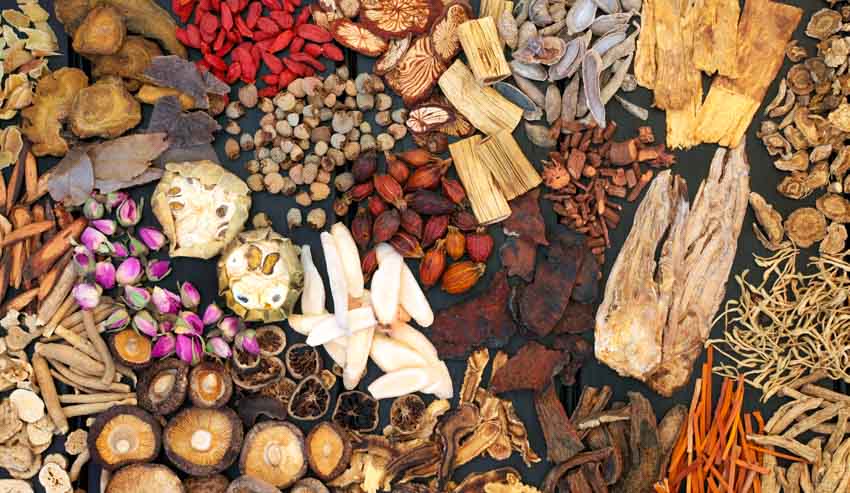
Acupuncture and Chinese herbal medicine for the treatment of COVID-19 is safe and effective. Researchers determined that specific herbal formulas demonstrate purity, potency, and efficacy. In addition, acupuncture treatments address signs and symptoms including coughing, fatigue, and fevers. In this article, we highlight essential herbal medicine findings.
Researchers from the University of Texas Health Science Center (Houston) and other healthcare centers reviewed the work of Sun et al. Published in the The American Journal of Emergency Medicine, the findings indicate that alternative therapies are potentially useful interventions for patients with COVID-19 (novel coronavirus, SARS-CoV-2). The doctors from Texas note that, in China, Chinese medicine “is an essential part of the armamentarium to treat these [COVID-19] patients,” and that this approach to integrative medicine may facilitate treatment at ports of entry for patients, which are often emergency rooms. [1]
This report was based on a metanalysis by Sun et al. In a randomized controlled clinical trial analysis of human COVID-19 patients with pneumonia, a total of 681 participants across seven valid studies were examined. The researchers conclude that the addition of Chinese medicine to conventional care improves clinical efficacy. Importantly, Chinese medicine “significantly increased viral nucleic acid negative conversion rate.” [2]
The researchers made three additional important discoveries. Chinese medicine “prominently reduced pulmonary inflammation,” “improved host immune function,” and did not increase the adverse effect rate. [3] The researchers confirm that for COVID-19 patients, Chinese medicine “exhibited superior performance” for improving the “clinical effective rate, viral nucleic acid negative conversion rate, remission rate of pulmonary inflammation, and biochemical markers.” [4]
The researchers discarded studies with risk bias and sorted for low risk bias for inclusion in the metanalysis. Results were based on quantifiable outcomes, including chest CT scans and remission rates from pulmonary inflammation based on CT scans and also biochemical marker improvements (e.g., WBC, IL-6, lymphocyte ratios).
Another metanalysis of 2,275 COVID-19 patients confirms these findings. The researchers determined that Chinese medicine (e.g. acupuncture, herbs) is standard medical care in China and that Chinese herbal medicine was one of the most frequently applied forms of Chinese medicine. The most common herbs used across 18 randomized controlled trials were: Gan Cao, Huang Qin, Ban Xia, Lian Qiao, Ku Xing Ren. The most common preparation method was decoction.
The research team compared Chinese herbal medicine with conventional medicine. Patients in the Chinese medicine group received either Chinese medicine monotherapy or Chinese medicine combined with conventional medicine. Patients in the conventional medicine group received conventional medicine monotherapy or conventional medicine plus a placebo instead of real Chinese medicine.
The research team determined that Chinese medicine significantly improved patient outcomes. The researchers note, “Our meta-analyses found that comparing CHM [Chinese herbal medicine] group and conventional western medicine group, CHM group has improvements in several clinical parameters including lung CT, clinical cure rate, ranging from mild to critical cases, length of hospital stay, total score of clinical symptoms, fever reduction time, symptom score of fever, number of cough reduction cases, symptom score of cough, number of fatigue reduction cases, symptom score of fatigue, disappearing time of fatigue, TCM syndrome, viral nucleic acid testing, and inflammatory biomarkers (C-reactive protein).” [5] They added that no severe adverse effects resulted from the use of Chinese herbal medicine.
The research team carefully documented methods of quantification and types of herbal formulas used. Some of the formulas reviewed were: Qingfie Touxie Fuzheng, Shufeng Jiedu capsules, Lianhua Qingwen capsules, Xuanfei Zhisou mixture, Shuang Huang Lian oral liquid, Yu Ping Feng granules, Gan Lu Xiao Du Dan, Ma Xing Shi Gan Tang, Chai Ling Ping Wei decoction, Hao Qin Qing Dan decoction, Huo Pu Xia Ling decoction, Qi Wei decoction, Xuebing injection, Tanreqing injection, Sheng Mai injection, Shenfu injection, Tou Jie Qu Wen granules, Jin Hua Qing Gan granules, Re Yan Ning mixture, Shu Feng Jie Du capsules, Lianhua Qing Ke granules, and many custom and standardized herbal formulas to address specific conditions, including pneumonia. Many herbs and acupuncture points for the treatment of COVID-19 and influenza symptoms are covered in the following acupuncture CEU course by Prof. Pang, L.Ac.: Influenza, Asthma, Bronchitis >
We highlight one of the formulations examined in the study. The formula was devised for the treatment of severe pneumonia and was given the name: Powerful Pneumonia #1 Formulation. The herbs in the formula were: Chai Hu, Huang Qin, Ban Xia, Bing Lang, Cao Guo, Gua Lou, Gan Cao, Hu Zhang, Huang Lian, Zhi Shi, Zhe Bei Mu, Jie Geng, Bai Bu, Qian Hu, Zi Wan, Kuan Dong Hua, Huo Xiang, Pei Lan. We see the treatment strategy addresses damp-heat, external wind-heat, shaoyang stage illness, and heat-toxins. Notably, herbs for the treatment of toxic phlegm and coughing are present. In other formulations, herbs such as Bai Shao, Dang Shen, and Hong Jing Tian are included to address severe fatigue and low blood oxygen levels.
References:
1. Varon, L. Dr Adylle, Daryelle S. Varon, and Joseph Varon. "Traditional chinese medicine and COVID-19: should emergency practitioners use it?." The American Journal of Emergency Medicine (2020).
2. Sun, Chun-Yang, Ya-Lei Sun, and Xin-Min Li. "The role of Chinese medicine in COVID-19 pneumonia: A systematic review and meta-analysis." The American Journal of Emergency Medicine (2020).
3. Ibid.
4. Ibid.
5. Xiong, Xingjiang, Pengqian Wang, Kelei Su, William C. Cho, and Yanwei Xing. "Chinese herbal medicine for coronavirus disease 2019: a systematic review and meta-analysis." Pharmacological Research (2020): 105056.


